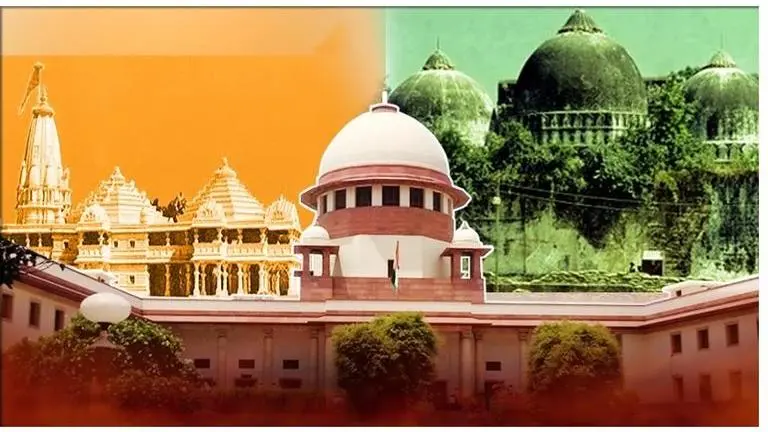Updated 6 August 2019 at 08:37 IST
Ayodhya Case: Supreme Court to commence day-to-day hearing on Tuesday in the Ram Janmabhoomi-Babri Masjid land dispute
The Supreme Court is set to commence day-to-day hearing from Tuesday in the politically sensitive case of Ram Janmabhoomi-Babri Masjid land dispute in Ayodhya
- India News
- 0 min read

The Supreme Court is set to commence day-to-day hearing from Tuesday in the politically sensitive case of Ram Janmabhoomi-Babri Masjid land dispute in Ayodhya after the efforts to arrive at an amicable settlement through mediation have failed.A five-judge Constitution bench headed by Chief Justice Ranjan Gogoi will conduct the hearing.
The bench, also comprising Justices S A Bobde, DY Chandrachud, Ashok Bhushan and S A Nazeer had on August 2 taken note of the report of the three-member mediation panel, headed by former apex court judge FMI Kalifulla, that the mediation proceedings which went on for about four months have not resulted in any final settlement.
"The hearing which will be on day-to-day basis until the arguments are concluded will start with the appeals arising out of the two suits. The learned counsel(s)...in the appeals arising out of the aforesaid suits may, for the convenience of the court, indicate the pleadings and the evidence on which they propose to rely, so that the officials of the Registry can keep the said documents ready for perusal of the court," the bench had said in its order. Fourteen appeals have been filed in the apex court against the 2010 Allahabad High Court judgment, delivered in four civil suits, that the 2.77-acre land in Ayodhya be partitioned equally among the three parties -- the Sunni Waqf Board, the Nirmohi Akhara and Ram Lalla.
Advertisement
On December 6, 1992, the Babri Masjid, constructed at the disputed site in the 16th century by Shia Muslim Mir Baqi, was demolished. The central government on January 29 this year moved the apex court seeking its nod to return the 67-acre undisputed acquired land around the disputed site to original owners.
The 0.313 acre plot, on which the disputed structure stood before it was demolished by 'kar sevaks' on December 6, 1992, was within the 2.77-acre disputed premises., the plea said. The government had then acquired 67.703 acres, including the 2.77-acre plot, through a legislation in 1993. The Ram Janambhoomi Nyas (RJN) is the owner of as much as 42 acres of the acquired non-disputed land.
Advertisement
The Centre's plea said that the RJN (a trust to promote construction of Ram Temple) had also sought return of excess land acquired to original owners. The Centre claimed that only 0.313 acre of land was disputed on which the structure stood before it was demolished by 'kar sevaks' on December 6, 1992. A week later, another petition was filed challenging the constitutional validity of 1993 Central law on land acquisition in Ayodhya near the disputed site, contending that Parliament has no legislative competence to acquire land belonging to the state. Seven individuals, including two Lucknow-based lawyers claiming to be devotees of Ram Lalla, said state legislature has exclusive power to make provisions on management of religious affairs inside its territory. The plea said the Acquisition of Certain Areas of Ayodhya Act, 1993 Act infringes right to religion of Hindus guaranteed and protected by Article 25 of the Constitution of India.
Mediation panel submits report
Earlier on July 31, the Ayodhya mediation panel was allowed to continue talks to reach consensus between Hindu and Muslim sides over the dispute of construction of Ram Temple in Ayodhya. After discussions, the panel has submitted the report and based on this report, the SC-bench is set to take up the matter on Friday.
Headed by Justice FM Kalifulla, senior advocate Sriram Panchu and spiritual guru Sri Sri Ravi Shankar, if the mediation panel reaches consent on the Ayodhya dispute, then the mediator's decision may be passed by the top court as the court decree. However, if the members fail to reach a consensus on the matter, the court will be hearing the case continuously after the panel submits its final report. The hearings will continue to take place until unless a verdict is passed.
Mediation panel formed to solve dispute
The Supreme Court had on July 18 asked the mediation committee on the Ram Janmabhoomi-Babri Masjid land dispute to continue the process and submit a report on the progress made till July 31. A Constitution bench comprising Chief Justice Ranjan Gogoi and Justices SA Bobde, DY Chandrachud, Ashok Bhushan and S Abdul Nazeer observed that it will take a call on August 2 on whether a hearing is required in the case. The apex court had made the mediation panel for 8-week and Uttar Pradesh's Faizabad was set as the location where the mediation would be held. The eight-week deadline for the mediation talks completed on May 3.
Published By : Press Trust Of India
Published On: 6 August 2019 at 08:10 IST
